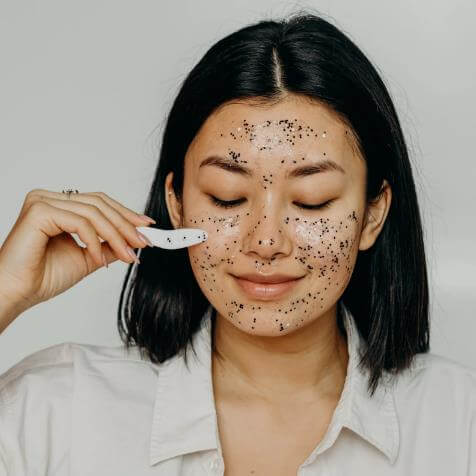
Are you concerned about those pesky blackheads on your nose? In this article, we will explore what blackheads are, how they form, and the best at-home skincare solutions you can use, utilizing easily accessible over-the-counter products to eliminate them.
What Exactly Are Blackheads?
Blackheads, medically referred to as "open comedones," are typically categorized as a mild, non-inflammatory form of acne [1]. They occur when pores become clogged with a buildup of dead skin cells, known as corneocytes, and excess sebum, the natural oil our skin produces for moisture. When these pores expand and remain open, the melanin within the sebum reacts with the oxygen in the air, resulting in the characteristic black appearance of the pore. The average diameter of blackheads ranges from 1 to 3 mm [2].

If these comedones do not open up, they are classified as whiteheads, as the contents remain trapped and do not oxidize.
Blackheads are most commonly found on areas of the face that contain a high concentration of sebaceous glands, with the nose being the most noticeable location, followed by the chin and cheeks.
What Factors Contribute to Blackhead Formation?
One of the primary factors leading to blackhead development is hormonal fluctuations, such as those experienced during puberty. However, other influences like genetics, smoking, or the presence of damaged and unhealthy skin can also play a significant role [3].
In general, the formation of blackheads can be characterized by specific processes [3]:
Effective Strategies for Removing Blackheads on the Nose
To effectively remove blackheads, it's essential to commit to a consistent skincare regimen that addresses the underlying causes of their formation, particularly oil production and irregular shedding of skin cells. While focusing on the nose is critical due to the visibility of blackheads in this area, you should also consider treating the entire face, as blackheads and enlarged pores may be present elsewhere.
Here are five skincare strategies you can implement at home to gradually eliminate blackheads:
1. Incorporate Foaming Cleansers
Cleansing your face is a fundamental step in any skincare routine, vital for keeping your skin clean and healthy.
Since blackheads are linked to excessive oil production, using foaming cleansers is ideal for effectively eliminating excess oil. Opt for a cleanser labeled as "gentle" or "mild" to ensure it removes excess oil without stripping your skin of moisture.
Foaming cleansers specifically designed to tackle blackheads typically contain salicylic acid (commonly referred to as BHA or beta-hydroxy acid), a key ingredient renowned for its ability to unclog pores.
How Does Salicylic Acid Work? Salicylic acid exhibits comedolytic properties, meaning it reduces the adhesion between corneocytes, which helps to loosen and detach the dead cells obstructing the pores [4]. Being lipid-soluble, it can penetrate the sebaceous glands and work from within the pores, while also decreasing sebum secretion, which enhances its effectiveness [4].
What to Look For? Choose foaming cleansers that contain 2% salicylic acid (also indicated as 2% BHA).
How to Use It? Begin by using the product once daily, preferably in the evening. Apply it to a wet face, massaging it into the target areas, such as the nose. Allow it to sit for 2-3 minutes to let the BHA do its work before rinsing it off. An example of such a product is The INKEY List Salicylic Acid Acne + Pore Cleanser.
2. Exfoliate with BHA
Another effective method to integrate the benefits of salicylic acid (BHA) into your routine is by using exfoliating solutions or serums that contain 2% BHA. As mentioned earlier, salicylic acid is a potent exfoliating agent because of its ability to disrupt the cohesion between corneocytes [4], thereby removing the dead cells that clog your pores.
Popular options on the market include Paula’s Choice Skin Perfecting 2% BHA Liquid Exfoliant and The Ordinary Salicylic Acid 2% Anhydrous Solution Pore Clearing Serum.
Additionally, you may find products that combine 2% BHA with other chemical exfoliants, such as AHAs (alpha-hydroxy acids, including glycolic or lactic acid), to enhance exfoliation. An example of such a combination is Glow Recipe Strawberry Smooth BHA + AHA Salicylic Acid Serum.
How to Use 2% BHA Exfoliants? These should be applied as leave-on products. Begin by using them every other day to assess your skin's reaction. If well-tolerated, you can progress to daily use (ensure to follow the specific instructions for your chosen product). If applying in the morning, always follow up with sunscreen that has an SPF of 30 or higher. If using at night, avoid simultaneous use with retinol to minimize the risk of irritation (unless your skin can tolerate both).
3. Utilize Clay Masks
Clay masks can also be beneficial in reducing the visibility of blackheads. They work by absorbing and removing excess oil and impurities from the skin due to their high adsorption and absorption capabilities [5]. Clay masks can help open clogged pores, stimulate sweat and oil production, and some even inhibit the growth of C. acnes (for instance, Dead Sea black mud) [6].
Research conducted over six weeks on individuals prone to acne demonstrated the effectiveness of applying clay masks 2-3 times per week in reducing acne-related skin lesions, including blackheads [7].
An example of a clay mask is Kiehl’s Rare Earth Deep Pore Minimizing Cleansing Clay Mask.
How to Use a Clay Mask? After cleansing your face, apply a layer to the targeted areas, such as the nose or the entire T-zone. Let it dry for 10-15 minutes before rinsing it off with warm water. This process can be repeated once or twice a week, depending on how well your skin tolerates it.
4. Switch to "Oil-Free" Moisturizers and Sunscreens
To enhance the improvement and prevention of blackheads, it is critical to avoid






































